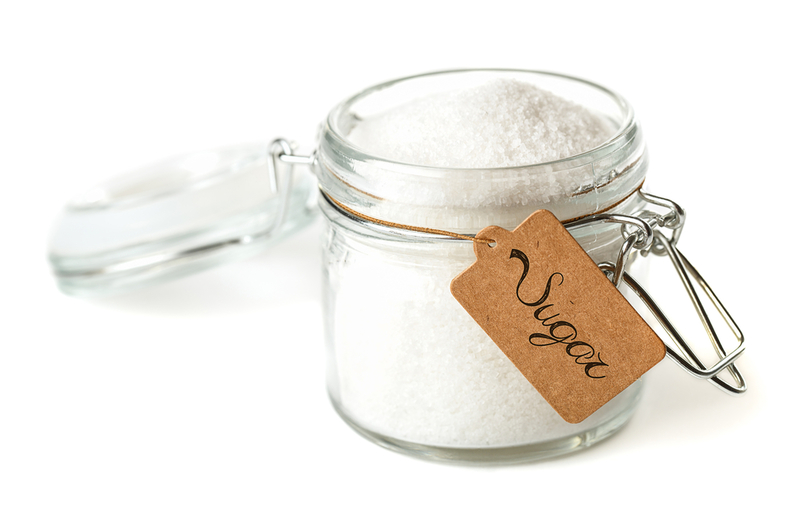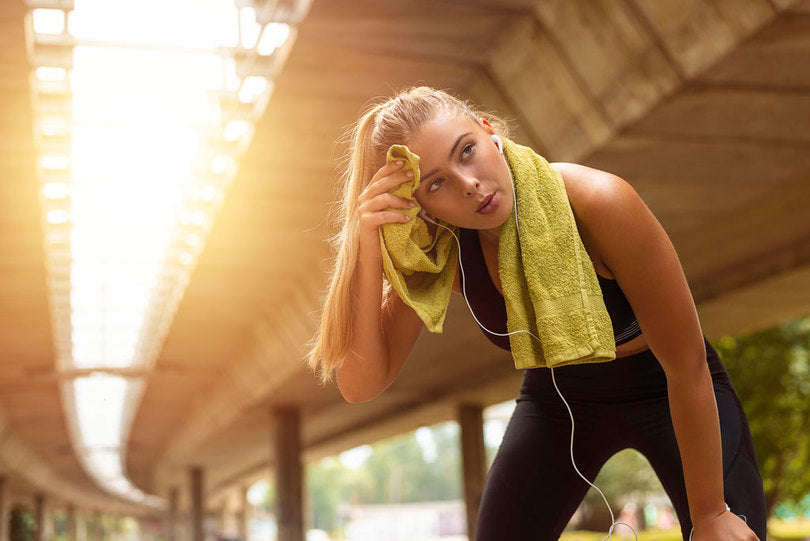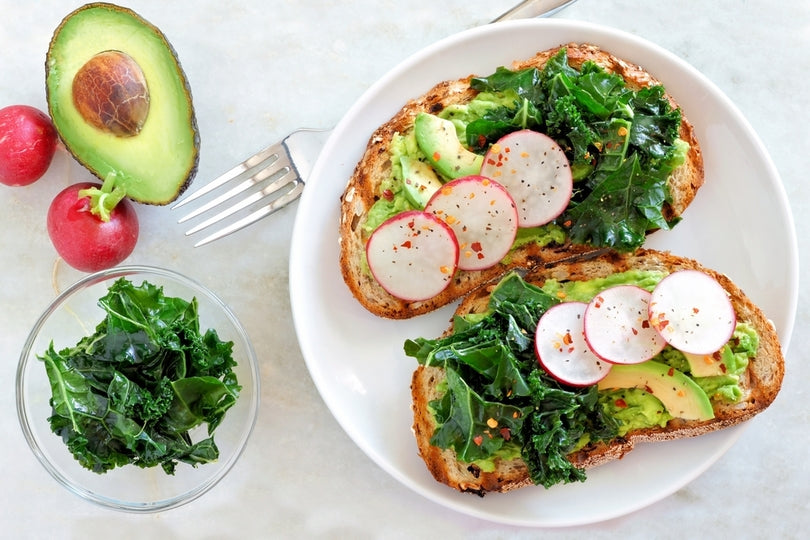Foods That Can Trigger Anxiety


If you have any form of anxiety, then you know that it can often make you feel like you are on edge.
According to the National Institute of Mental Health, anxiety disorders affect 40 million adults in the United States in any given year, about 18% of the population. That makes anxiety disorders the most common mental illness in the country.
There are many symptoms of anxiety that may, in part, be put down to lifestyle — hectic work schedules and busy lives can sometimes contribute to feelings of anxiety. But have you ever wondered whether there are foods that cause anxiety?
Jump to:
- Are there foods that cause anxiety?
- Foods to avoid if you have anxiety
- Foods that can ease anxiety
- Try these foods to reduce anxiety
Today I want to talk about the role that food and drink may play when it comes to anxiety conditions.
Are there foods that cause anxiety?
There are many different forms of anxiety and just as many (if not more) factors that can lead to the development of an anxiety condition.
Apart from these external factors, it is possible to feel anxiety after eating or to be triggered by particular foods that may be in your diet.
I always talk about eating healthy foods because of the health benefits but these benefits don’t just stop at weight loss! Eating a well-balanced, healthy diet can help your entire body, including your nervous system, which plays a large role in feelings of anxiousness.
Eating certain foods may cause anxiety conditions to feel worse, just like eating some foods can have a positive, calming effect on your body and mind. While diet isn’t the main cause of anxiety for many people, a healthy diet can help with the management of some anxiety symptoms.
Knowing what foods to eat and what foods to avoid eating with anxiety may help you to manage your symptoms.
Foods to avoid if you have anxiety
If you have anxiety, avoiding these foods can help you to manage anxious feelings.

Caffeine
If you live for your morning coffee and simply can’t function until you’ve finished it (and are already looking forward to the next one) this may be taking a toll.
The side effects of excessive caffeine consumption can include heart palpitations, shaking and difficulty sleeping. Even if you don’t experience any of these side effects straight away, caffeine can still affect your body hours later. Many people also have caffeine sensitivity without knowing it, so that cup of coffee could be doing more harm than good. Try cutting back on your caffeine intake of finding an alternative to coffee and see if you notice a difference.
Now, this doesn’t just apply to coffee. It also includes energy drinks, tea or other caffeinated substances.
Food additives
Man-made food additives have been used for so many years to enhance the appearance and flavour of our food but not many people realise just how bad they can be for you. There is an association between some of these additives found in foods and anxiety symptoms. These are:
Aspartame
Also known as Sweetener (951), aspartame is used to replace sugar in a number of products, from ‘sugar-free’ soft drinks to gums and other tabletop sweeteners. Researchers have found a link between regular consumption of aspartame and a number of health conditions, including anxiety.
High Fructose Corn Syrup
High Fructose Corn Syrup (shortened to HFCS) is a highly refined sweetener that can be found in most processed foods, particularly in the U.S. HFCS is very high in calories and, like aspartame, is often considered a contributing factor to a number of illnesses.
MSG
This is an amino acid that is used as a flavour enhancer in soups, dressings, snacks foods and frozen foods. MSG is an excitotoxin which over-excites cells to the point of damage. Regular consumption has been linked to depression, headaches and fatigue.
Food dyes
Food dyes can often be found in soft drinks, salad dressings, fruit juices and cheese. Some food dyes, particularly Red #40 and Yellow #5, can disrupt normal nervous system function, which may increase symptoms of anxiety after eating them.

Salt
Diets that are high in salty foods can increase blood pressure, which forces your heart to work harder. When this happens, your body releases the stress hormone adrenaline which can lead to feelings of edginess and tension. So if you are eating salty foods before bed, instead of calming your body down, you could be making it work harder.
To avoid eating excessive salt, try using herbs and spices to add flavour to home-cooked meals, rather than relying on added salt. If possible, avoid buying pre-flavoured meats, as these can also contain high levels of salt. Also, try not to add salt to dishes when dining out as foods often already have large amounts of added salt.

Sugar
The big question for those with a sweet tooth — does sugar cause anxiety?
Like salt, you should try to avoid foods that contain refined sugars.
After eating sugar, you will generally feel a burst of energy and then a drop in blood sugar levels. This can not only leave you feeling tired and sluggish, it may also make you feel anxious.
When your blood sugar levels are irregular and drop from high to low constantly, the hormones adrenaline and cortisol are released, which can cause anxiety and panic. If you tend to reach for sweets at 3pm because you are suddenly starving, you may not only be messing up your energy levels but it could leave you feeling edgy and irritable for the next few hours. Not a good mix if you have already had a long day filled with deadlines and email overload!
So, should you be worried if sugar causes anxiety? A sugar crash can leave you feeling irritable and tense, which can mimic and also intensify anxious feelings. Reducing the amount of refined sugar you eat can help your blood sugar levels to be more balanced, so you avoid those nasty highs and lows.

Junk food and fast food
Sometimes when we are feeling stressed or overwhelmed, the idea of driving to the nearest takeaway and indulging in a big juicy burger is tempting. Unfortunately, having a burger may lead to feelings of anxiety after eating it, due to the number of preservatives and food chemicals it may contain.
While the burger may satisfy you for a few minutes, the effects it has on your body can continue for many hours later. No, you don’t have to only eat salad but instead of takeaway, opt for some lean protein which provides your body with nutrients and can keep you feeling fuller for longer, while also helping to stabilise your moods. If you really want a burger, try my healthier Mediterranean chickpea burger recipe instead.
Alcohol
If having a glass of wine to relax is something you look forward to after a stressful day, you might be making your anxiety condition worse.
Alcohol is a depressant and interferes with the production and use of serotonin, which is a neurotransmitter that helps to regulate mood. Alcohol also significantly hinders your metabolism. So that glass of wine before bed could potentially alter your blood-sugar levels and hydration, which may lead to a restless, rather than a restful, sleep.
If you use alcohol as a way to wind down after a long day, try replacing it with natural ways to reduce anxiety, like taking a bath or doing some yoga.
Foods to eat that can ease anxiety
To help reduce anxiety, try adding some of these foods to your diet.

Omega-3 fatty acids
Omega-3 fatty acids, which are the good fats found in salmon and other fatty fish, can help to protect against inflammation. These fats have also been shown to improve mood and reduce stress by lowering cortisol levels. I love serving up some grilled salmon with a dill yoghurt sauce to get my omega-3!

Chamomile tea
Chamomile tea has been used to help calm the body for centuries! The relaxing properties of chamomile can help reduce feelings of anxiety by calming your mind. If you are having trouble going to sleep at night, a cup of this tea at bedtime could really help you.

Complex carbohydrates
Eating complex carbs, such as brown rice and wholegrain bread, can help reduce anxious feelings because they are full of magnesium, which helps to calm the nervous system.
If your magnesium levels are low, you may experience added stress and anxiety. Foods that contain good amounts of magnesium include green leafy vegetables, such as kale and swiss chard, so try to increase how often you eat these foods to help reduce anxiety.
Complex carbs also contain the amino acid tryptophan, which the body converts into serotonin, an important mood hormone. So swap out white refined carbs for brown ones and see the difference for yourself. You should also notice that this helps you to stay fuller for longer and have more energy!

Blueberries
As if you needed any more reason to eat blueberries, but here it is! Blueberries are considered a superfood as they are rich in phytonutrients, vitamins and antioxidants, which can be beneficial for relieving stress. Munch on them as a healthy mid-morning or afternoon snack instead of reaching for a bag of chips.

Asparagus
Asparagus is rich in sulfur and contains the B vitamin folic acid. Levels of low folic acid are linked to neurotransmitter impairment, which can cause anxiety. I love serving asparagus grilled alongside my salmon, put those two together and you have a winning dinner combo!
Try these foods to reduce anxiety
The food we eat has such a huge impact on both our physical and mental health. While this list of what you should eat and what foods to avoid with anxiety isn’t a complete guide, it can help to be part of a valuable management strategy.
Anxiety can have a big impact on your life, so make sure you are doing what you can to take care of yourself. You may wish to speak with a healthcare professional for assistance in managing your form of anxiety, particularly if you are having a tough time.
* Disclaimer: This blog post is not intended to replace the advice of a medical professional. The above information should not be used to diagnose, treat, or prevent any disease or medical condition. Please consult your doctor before making any changes to your diet, sleep methods, daily activity, or fitness routine. Sweat assumes no responsibility for any personal injury or damage sustained by any recommendations, opinions, or advice given in this article.




<#= c.user.username #><#= moment(c.created_at * 1000).fromNow() #>
<#= c.html_body #> <# if (c.images) { #>
<# } #>